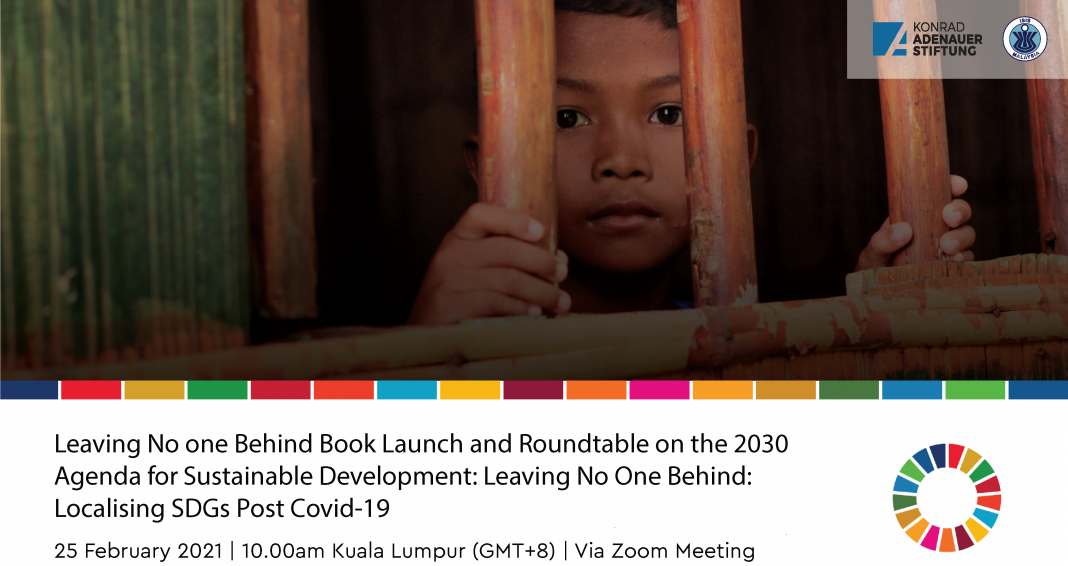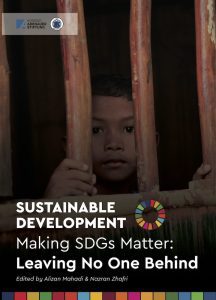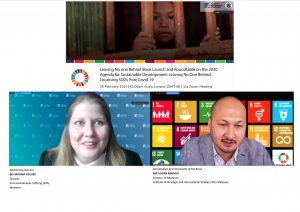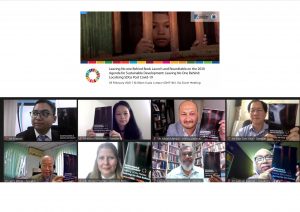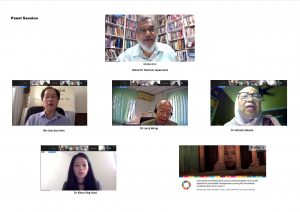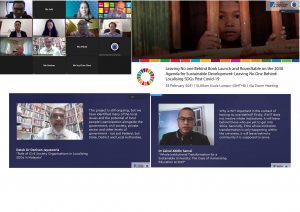Leaving No one Behind Book Launch and Roundtable on the 2030 Agenda for Sustainable Development:
Leaving No One Behind: Localising SDGs Post Covid-19
25 – 26 February 2021, Online (Zoom)
Background
The Sustainable Development Goals (SDGs) was adopted in 2015 by all United Nations member states as the global development agenda. Replacing the Millennium Development Goals (MDGs), one of the core challenges and objectives of the SDGs is to address the fact that while the MDGs were successful in halving poverty and achieving, or at least progressing towards all of its goals, the achievements were uneven across and within countries. Within countries, many UN member states, Malaysia included, successfully achieved the MDGs at the aggregated and national level. However, when disaggregated across geographically (urban/rural), across economic status (i.e. B40), gender, disability, identify (i.e. indigenous peoples, religion, etc), and other criteria, the reality is that many vulnerable communities are still left behind in development. Towards this end, one of the core principles of the SDGs is to leave no one behind.
Towards this end, this roundtable will focus on localising SDGs as a way forward in leaving no one behind. As a global framework, the implementation of the SDGs will only be successful if it is translated to the local level. This will require taking into consideration the local context, development challenges, governance systems as well as local potential. Furthermore, it requires an institutional framework that can both translate the global framework to meet local needs as well as to provide a bottom-up approach in addressing the SDGs.
The effectiveness and influence of the Sustainable Development Goals (SDGs) are dependent on their feasibility to be translated into and implemented at the local context. While the Millennium Development Goals (MDGs) were lauded for halving poverty and achieving its various goals, the achievements were imbalanced across and within countries. One of the key principles of the SDGs to address this shortcoming is the principle of “Leaving No One Behind”. This entails that the achievement of the SDGs is not only at the aggregate level, but also at the disaggregated level. To uphold this ambitious principle, the SDGs are required to be applicable not only to the national context, but also to the local level.
Rationale
Towards understanding the context of Leaving No One Behind and efforts to localise the SDGs in Malaysia, two events are covered under this roundtable. The first part is a book launch of the book ‘Making SDGs Matter – Leaving No one Behind’. The book is a culmination of the series of roundtables held by KAS and ISIS Malaysia on SDGs in 2019. It specifically looks into four areas in broadening and deepening the concept of leaving no one behind with a focus on Orang Asli and Orang Asal; Food security and rural development; Climate Change Adaptation; and Institutional Reforms for SDGs. The Book Launch will elaborate on the issue of Leave No one Behind from these multiple perspectives.
The second part is a close door expert roundtable on localising the SDGs. It will leverage on the existing All-Party Parliamentary Group on SDGs (APPGM-SDG) that is undertaking research in ten parliamentary constituencies in Malaysia. The constituencies, which cover all regions or corridors of Malaysia will be a good indication and representation of the challenges that local communities face and the potential solutions towards solving those challenges. It is divided into both urban and rural local economies and the issues as well as solutions towards addressing those challenges.
Roundtable Objectives
The purpose of the roundtable on “Leaving No One Behind: Localising SDGs Post Covid-19” is to contribute to addressing the challenge above by providing recommendations for addressing the local impacts of COVID-19 to the local economy.
Expected Output
The views expressed during the Roundtable session will be utilized to formulate a Policy Dialogue Brief, which will not constitute a synthesis of statements by participants, but rather an interpretation by ISIS Malaysia of the main issues and concerns that were discussed.
Programme
Day 1 – 25th February 2021
1000 - 1010 : Welcoming Remarks
Ms Miriam Fischer
Resident Representative Malaysia
Konrad-Adenauer-Stiftung (KAS)
1010 – 1020 : Editor’s Introduction and Comments of the Book
Mr Alizan Mahadi
Director of Research
Institute of Strategic and International Studies (ISIS) Malaysia
1020 – 1035 : Keynote Address and Launching of the Book
YB Dato’ Sri Mustapa Mohamed
Minister
Economic Planning Unit (EPU)
Prime Minister’s Department
1035 - 1200 : Panel Session
Moderator:
Datuk Dr Denison Jayasooria (Institutional Reforms for SDGs)
Secretariat Chair
All-Party Parliamentary Group on SDGs (APPGM-SDG)
Panelists:
Mr Kon Onn Sein (Orang Asli and Orang Asal)
General Manager
Yayasan Kajian dan Pembangunan Masyarakat (YKPM)
Dr Salmah Zakaria (Climate Change Adaptation)
Chair
Water Sector Transformation 2040
Dr Larry Wong (Food Security and Rural Development)
Senior Fellow
Institute of Strategic and International Studies (ISIS) Malaysia
Dr Khoo Ying Hooi (Institutional Reforms)
Senior Lecturer
Department of International and Strategic Studies
Faculty of Arts and Social Science
Universiti Malaya (UM)
Q&A
Day 2 – 26th February 2021
1000 - 1130 : Roundtable 1: Building Local Economy in Urban Areas
SESSION 1: IMPACTS OF COVID-19 TO LOCAL URBAN ECONOMY
Moderator:
Prof Dato’ Dr Rashila Ramli
Principal Fellow
Institute of Malaysian and International Studies (IKMAS)
Universiti Kebangsaan Malaysia (UKM)
Speakers:
YB Maria Chin Abdullah
Member of Parliament
Petaling Jaya Constituency;
Deputy Chair
All-Party Parliamentary Group on SDGs (APPGM-SDG)
YB William Leong
Member of Parliament
Selayang Constituency
Assoc Prof Dr Zaimuariffudin Shukri Nordin
Senior Lecturer
Faculty of Cognitive Sciences and Human Development
Universiti Malaysia Sarawak Malaysia (UNIMAS)
Mr Kiu Jia Yaw
Deputy Co-chair
Bar Council Environment and Climate Change Committee (BCECCC)
1130 – 1300 : Roundtable 2: Building Local Economy In Rural Areas
SESSION 2: IMPACTS OF COVID-19 TO LOCAL RURAL ECONOMY
Moderator:
Mr Alizan Mahadi
Director of Research
Institute of Strategic and International Studies (ISIS) Malaysia
Speakers:
Dr Zainal Abidin Sanusi
Director
Sejahtera Centre
International Islamic University of Malaysia (IIUM)
YB Dato Sri Hajjah Rohani Abdul Karim
Member of Parliament
Batang Lupar Constituency
Dr Jain Yassin
Senior Lecturer
Universiti Teknologi Mara (UiTM)
Dr Juita Mohamad
Fellow
Economics, Trade, and Regional Integration (ETRI)
Institute of Strategic and International Studies (ISIS) Malaysia
SDG Book
For those who is interested to get the physical copy of the book, please express your interest to Mr Louis Denis at louis.denis@isis.org.my or you may obtain the book at the Institute of Strategic and International Studies (ISIS) Malaysia.
No. 1, Persiaran Sultan Salahuddin
P O Box 12424, 50778 Kuala Lumpur, Malaysia
Event photo gallery
Recording of the event
Keynote Address by YB Dato’ Sri Mustapa Mohamed
SDG Book Launch
Highlight by Dr Khoo Ying Hooi (Institutional Reform)
Highlight by YBhg Datuk Dr Denison Jayasooria ( Institutional Reform)
Organisers




